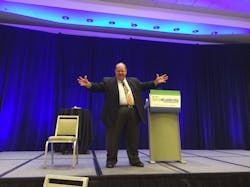SLC 2014: ‘Would You Like Me to Watch Out for Your Safety?’
Safety speaker John Drebinger has a vision for the future of workplace safety. It’s a place where EHS professionals leverage their leadership skills and strategic acumen to build world-class safety programs.
But it’s also a place where “everyone’s eyes are watching out for everyone else,” Drebinger asserted during a Monday keynote at EHS Today’s Safety Leadership Conference in Indianapolis.
Drebinger shared two tools to help EHS professionals create an environment in which every worker is his brother's keeper. One tool is a simple question.
“You see somebody doing something unsafe, and you simply walk over and say, ‘Hey, would you like me to watch out for your safety?'” Drebinger explained.
The other tool is this phrase: “as you know.”
Drebinger offered a few examples of how workers might use the phrase to approach their co-workers about safety. “As you know, there’s a trip hazard over there,” he said. “As you know, you need to use the handrail on the stairs when you go up and down.”
When you make it comfortable for somebody to point out a hazard to somebody else, they’re willing to do it.— John Drebinger
Many workers aren’t comfortable confronting their peers about unsafe behaviors and conditions. Drebinger sees these two tools – “as you know” and “would you like me to watch out for your safety?” – as antidotes.
“When you make it comfortable for somebody to point out a hazard to somebody else, they’re willing to do it,” he said.
The point of both techniques is to show the person on the receiving end of the safety suggestion that your peer “cares enough about you that they don’t want to see you get hurt.”
“I don’t know about you, but I can’t have too many people in this world caring about me,” Drebinger said. “The more people that care about me, the better off I am.”
More John Drebinger: Helpful Safety Phrases Everybody Should Know
When someone uses one of these tools to approach you about safety, it’s important to keep the loop going.
Drebinger offered several examples from his speaking engagements. At a Dow Corning plant in Carrollton, Ky., a worker watched his presentation (in which Drebinger sliced a lemon in half as part of a magic trick) and approached him afterward. Using the technique that Drebinger had just taught him, the worker asked Drebinger, “Would you like me to watch out for your safety?” Then the man gave Drebinger a pair of leather gloves to protect his hands the next time he cut the lemon.
A few weeks later during another presentation, an attendee watched the magic trick and asked Drebinger, “Would you like me to watch out for your safety?” Then the man offered Drebinger a pair of cut-resistant Kevlar gloves – unaware that the leather gloves that Drebinger had received a few weeks earlier were lined with Kevlar as well.
Drebinger graciously accepted the second pair of gloves, and didn’t tell the man that his leather gloves indeed were lined with Kevlar.
“Why didn’t I tell him that they have a Kevlar lining? Because at the very least, that would’ve stolen his moment,” Drebinger said. “He’d just listened to my talk and was using the technique within minutes. I want to reward that – I don’t want to stomp on that.”
When somebody points safety out to you, it’s your job to make them feel so good that they’re looking for the next person to help.— John Drebinger
In the middle of a presentation at the National Safety Council’s annual Conference and Expo, a woman in the audience asked Drebinger if he’d like her to watch out for his safety. Then she told him that one of his shoes was untied.
To reward her for watching out for his safety, Drebinger asked his granddaughter to draw a picture of him, with a message at the top of the page thanking the woman for “watching out for pop.” He sent the picture to the woman.
“When somebody points safety out to you, it’s your job to make them feel so good that they’re looking for the next person to help,” Drebinger said.
